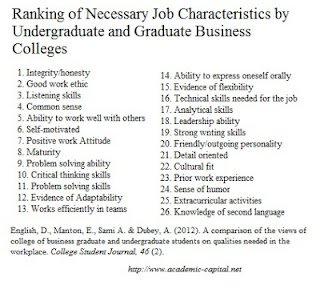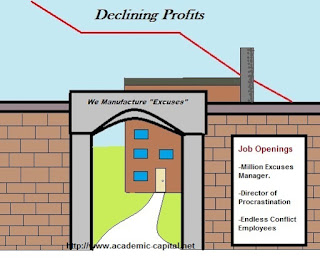We hear a lot about
what skills are needed within the workplace from the perspective of the
employer but we do not often hear about student perspectives. Research helps
highlight how undergraduate and graduate students view the necessary skills to
be successful in the workplace. It is surprising to find that both
undergraduate and graduate students have some similarities but also some differences
in their skill perception.
Employers are regularly
looking for a whole host of necessary skills from recent graduates. At 2006
survey entitled Are They Ready to Work
found that employers valued work ethic, written and
oral communication, teamwork / collaboration, critical thinking, problem
solving, and ethics /social responsibility. With over 400 employer participants
the survey can be seen as a strong benchmark for recruiter needs.
A survey conducted by Ingbretsen (2009) helped to
further lend support to the skills employers request from recent graduates.
Such skills were communication skills, work ethic, teamwork, and analytical
skills. Such employers desire to find employees that know how to work in groups
and use their analytical skills to solve important organizational problems.
What employers view as important isn’t necessarily
what students feel is important. Understanding the differences in perceptions
might help narrow the gap through further education and encouragement. If
employers are requesting one thing and new employees are emphasizing another
then there is bound to be some initial friction as graduates adjust to new work
roles.
Research conducted by
English, Manton, Sami and Dubey (2012) helped to shed light on the differences
in opinion between undergraduate and graduate students between the
characteristics needed in the workplace.
A total of 153 graduate students and 360 undergraduate students were
surveyed on 26 characteristics needed to be successful in the workplace. All of
the students were either from a Business Administration or MIS course at
A&M University.
Results:
-Integrity and Honesty
were ranked first for both graduate and undergraduates.
-Strong work ethic was
ranked second for both graduate and undergraduates.
-Both graduate
and undergraduate students focused more on intrinsic qualities that included integrity, good
work ethic, listening skills, common sense, self motivated, positive work
attitude, maturity, problem solving ability and critical thinking skills.
-Undergraduates ranked maturity
and critical thinking skills as higher than graduate schools.
-Both graduates and
undergraduates ranked a positive attitude as high.
-The lowest rankings for both
graduate and undergraduate students was cultural fit, prior work experience, extracurricular
activities, and knowledge of a second language.
-Both graduate and undergraduate
students ranked writing skills lower than studies conducted by others.
Analysis:
The study helps to create greater
understanding of how undergraduate beliefs adjust when entering into graduate
students. This also emphasizes how employer’s perspectives may not be the same
as new employees entering into the market. Even with a number of differences
there are plenty of similarities that can be emphasized for shared
perspectives. Colleges can also provide stronger emphasis on employer desired
characteristics while employers can enhance employee expectations through their
training programs limiting any negative effects of divergence of beliefs.
English, D., Manton, E., Sami A.
& Dubey, A. (2012). A comparison of the views of college of business
graduate and undergraduate students on qualities needed in the workplace. College Student Journal, 46 (2).
Ingbretsen, R. (2009, February
18). What employers really look for when hiring
a college graduate. Retrieved from http://searchwarp.com/swa437827-What-Employers-Really-Look-For-When-Hiring-ACollege-Graduate.htm
The Conference Board, Corporate
Voices for Working Families, Partnership for 21st Century Skills, and Society
for Human Resource Management. Are they really ready to work? 21 Century
Skills

